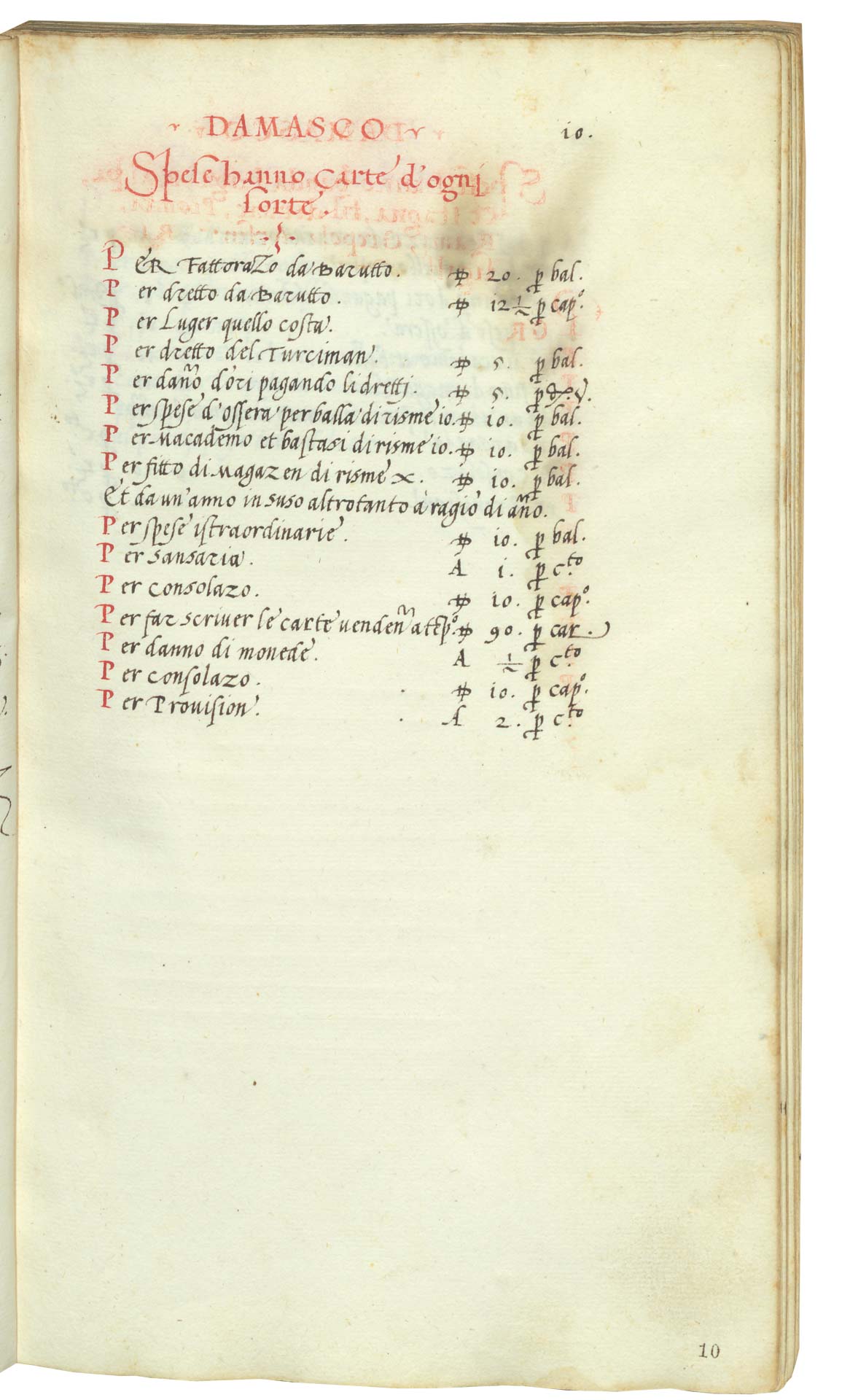Ottoman documents
Armenian documents
Exchanges across the global Mediterranean
15. Ship and caravan cargo from Syria to Genoa
16. Cargo from Alexandria (Egypt)
19. Tariffe Mercantili del Levante
20. ‘Re della China’. Compendio di geografia e statistica.
21. Book of accounts and exchange charges marked ‘A’, Del Vernaccia & Arrighi trading firm (1637–39)
22. Merchant’s declaration of the current exchange rates between Dutch and Smirnese coins
24. Attestatie (general witness testimony) notarial deed, drafted by notary Daniel Bredan
25. Contract between merchant Antonio de Lespaul and Jan Brouwer
26. Transaction for the purchase of silk for export abroad
27. Letter from Hernando de Morales in Lisbon, to Simón Ruiz in Medina del Campo
28. Royal Warrant from the infanta and regent, Juana de Austria
30. An inventory of the brigantino of Antonio Gusman with one bill of lading
32. Trade fair notebook. Medina del Campo, 17 June 1584 to 7 August 1586
19. Tariffe Mercantili del Levante
2523, cc. I, 71, II
SENDER: Unknown
GENERAL INFORMATION: Paper manuscript. Bound in parchment. Dated 25 November 1534.

The heading of Riccardiana Ms 2523 proclaims its nature as a record of prices and tariffs for merchants and goods trading with Damascus and the rest of Syria. Dated 25 November 1534, the tariffa was put together under the supervision of patricians who belonged to some of the most prominent Venetian families. One of them is Piero da Molin, who is mentioned in his capacity as consul, i.e., a diplomatic agent in charge of mercantile affairs who had negotiated some of these tariffs with the Muslim authorities in the Levant. The other Venetian grandee whose name appears as one of those responsible for the compilation of these tables is Marco Antonio Grimani. This tariffa was, in short, negotiated, drafted and enforced by the Venetian establishment for its deals with the Levant in the early years of the sixteenth century. As such, it is proof of the sophisticated administrative structures that Venice had developed to regulate and run the exchange of goods, the movement of people and the circulation of value – financial and otherwise. This control required an equally complex and sophisticated system for the recording of information and its systematic processing so that the same standards could be applied over different products, locations and practices. They also required negotiation with foreign authorities and merchants with a view to the establishment of treatises and standard methods for cross-cultural and cross-linguistic trade.
Our tariffa constitutes a case study for this kind of documentary genre, which was used as an instrument for the regulation of trade and as a tool for the calculation of the costs involved in its practice. It also amounts to a catalogue of the material products that were traded between Venice and the Levant during the early decades of the sixteenth century. And by registering and quantifying expenses incurred for translations and translators, it also incorporates the cost involved in the practice of the cross-cultural and cross-linguistic exchange of information – a sine qua non for international trade. In other words, it incorporates data regarding the material foundations of trade (goods, their prices, their weights and measures) alongside its inescapable immaterial dimension, by quantifying and listing expenses for translation (turcimanarie) and translators. Turcimanni (i.e., translators, or interpreters, from the Old Arabic targumān) were the cultural and linguistic mediators whose intervention was fundamental for the establishment of trade and diplomatic relations – two practices that complemented each other, as demonstrated by the inclusion of the consul Piero da Molino as one of the supervisors of the tariffa and the negotiators of its terms. Turcimanni established linguistic and cultural equivalence, as much as some of the tables included in the manuscript facilitated the equivalence of different exchange rates, or different weights and measures. Significantly, our tariffa also lists and quantifies important aspects of the paper trade, the material medium employed for the registration and communication of information (fol. 10r).
(José María Pérez Fernández)
Ottoman documents
Armenian documents
Exchanges across the global Mediterranean
15. Ship and caravan cargo from Syria to Genoa
16. Cargo from Alexandria (Egypt)
19. Tariffe Mercantili del Levante
20. ‘Re della China’. Compendio di geografia e statistica.
21. Book of accounts and exchange charges marked ‘A’, Del Vernaccia & Arrighi trading firm (1637–39)
22. Merchant’s declaration of the current exchange rates between Dutch and Smirnese coins
24. Attestatie (general witness testimony) notarial deed, drafted by notary Daniel Bredan
25. Contract between merchant Antonio de Lespaul and Jan Brouwer
26. Transaction for the purchase of silk for export abroad
27. Letter from Hernando de Morales in Lisbon, to Simón Ruiz in Medina del Campo
28. Royal Warrant from the infanta and regent, Juana de Austria
30. An inventory of the brigantino of Antonio Gusman with one bill of lading
32. Trade fair notebook. Medina del Campo, 17 June 1584 to 7 August 1586

